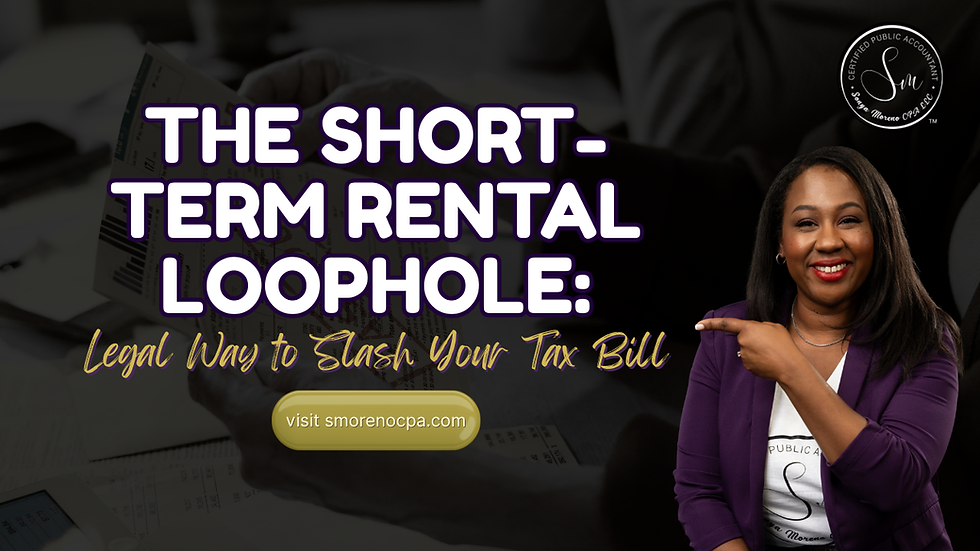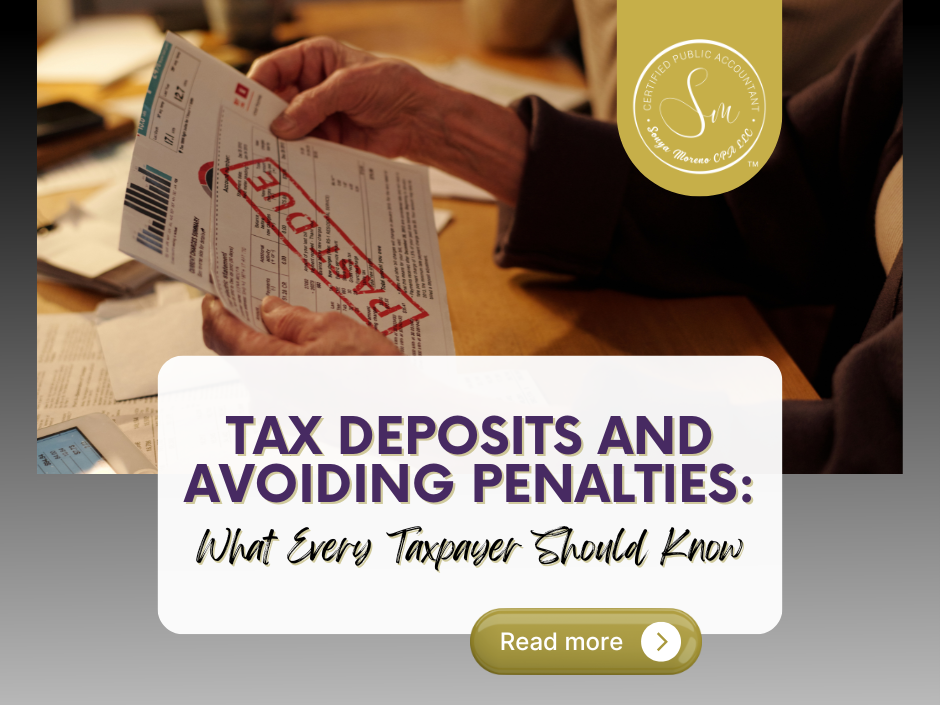🏠 The Short-Term Rental Loophole: A Legal Way to Slash Your Tax Bill
- sonya9686
- Nov 13, 2025
- 3 min read
Updated: Nov 15, 2025
If you own an Airbnb or vacation rental, you could be sitting on a major tax-saving opportunity. The Short-Term Rental (STR) Loophole is one of the most effective, IRS-approved ways to turn property ownership into a powerful tax strategy — especially for high-income earners and real estate investors.
This isn’t a gray-area trick. It’s a smart, legal way to reduce your taxable income, even if you don’t qualify as a real estate professional.

💡 What Is the Short-Term Rental Loophole?
Under typical IRS rules, rental income is considered passive. That means your rental losses can’t offset your active income (like wages, business profits, or self-employment earnings) unless you’re a qualified real estate professional.
But here’s where the Short-Term Rental Loophole changes the game:
If your property’s average rental period is 7 days or less, it’s no longer treated as a “rental activity.” Instead, it’s classified as a business activity — which allows you to deduct losses against your active income, as long as you materially participate.
📊 Why It Matters for High-Income Earners
If you’re in a high tax bracket, every deduction matters.
Mortgage interest, property taxes, utilities, maintenance, and bonus depreciation can create paper losses that directly reduce your taxable income.
For example:
If you’re in the 35% tax bracket and claim $100,000 in deductions, that’s a $35,000 tax savings — money that can go right back into your investments or business growth.
Formula Example:
$100,000 Deductions × 35% Tax Bracket
= $35,000 Tax Savings
✅ How to Qualify
To benefit from this strategy, you must meet a few key requirements:
Keep your average stay under 7 days.
Keep your average guest stay at one week or shorter. Occasional longer stays are fine — just make sure the yearly average stays under seven days.
Materially participate in the rental.
You must actively manage the property by meeting at least one IRS participation test:
Spend 500+ hours on the activity,
Do substantially all of the work, or
Work 100+ hours and ensure no one else works more than you.
Document everything. Active Management.
Be hands-on — handle bookings, guest communication, marketing, and cleaning coordination yourself (not through a property manager).
⚠️ Common Mistakes to Avoid
Letting longer stays push your average over 7 days
Outsourcing all operations to property managers (reduces participation)
Failing to keep detailed logs and proof of work
Ignoring local short-term rental regulations
🏘️ Real-World Example
One of our clients purchased a small ski condo and applied this strategy.
The result? Over $70,000 in paper losses that offset their W-2 income — saving nearly $25,000 in taxes in the first year alone.
That’s money that can go toward another property, paying off debt, or expanding your portfolio.
📋 Action Checklist
Before year-end, make sure you:
✅ Keep your average stay under 7 days
✅ Track your hours for material participation
✅ Maintain logs for all expenses and deductions
✅ Review your plan with a qualified CPA before December 31hat can go toward another property, paying off debt, or expanding your portfolio.
🎥 Watch the Full YouTube Breakdown
Want to watch the strategy explained step-by-step?
We created a full, easy-to-follow video breaking down the Short-Term Rental Loophole with real examples, formulas, and the exact IRS rules you need to know.
Inside the video, you’ll learn:
✔ How to qualify under the 7-day IRS rule
✔ How to meet material participation requirements
✔ The $100K → $35K savings example
✔ What high-income earners should do before year-end
✔ Biggest mistakes to avoid
✔ Who should NOT use this loophole

🎯 The Bottom Line
The Short-Term Rental Loophole isn’t just for millionaires.
If your income is above $250,000, you’re self-employed, or you invest in real estate, this strategy could unlock major tax savings — but the timing is critical.
Most deductions must be executed before December 31 to count toward this year’s return.
📞 Ready to See if This Works for You?
Book a consultation with Sonya Moreno, CPA today to create your tax-smart real estate strategy.
Start planning before year-end and take control of your tax savings.
Book a FREE consultation today!





Comments